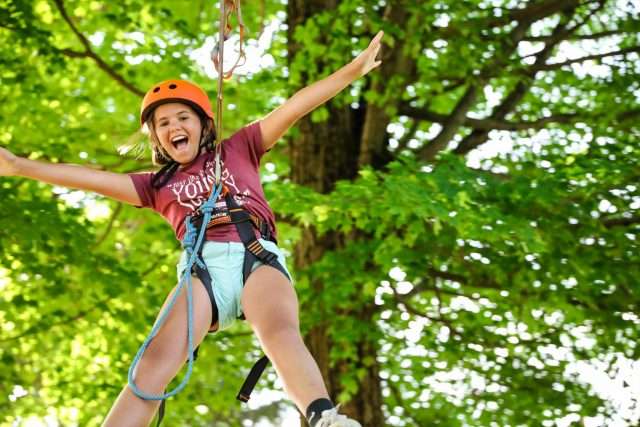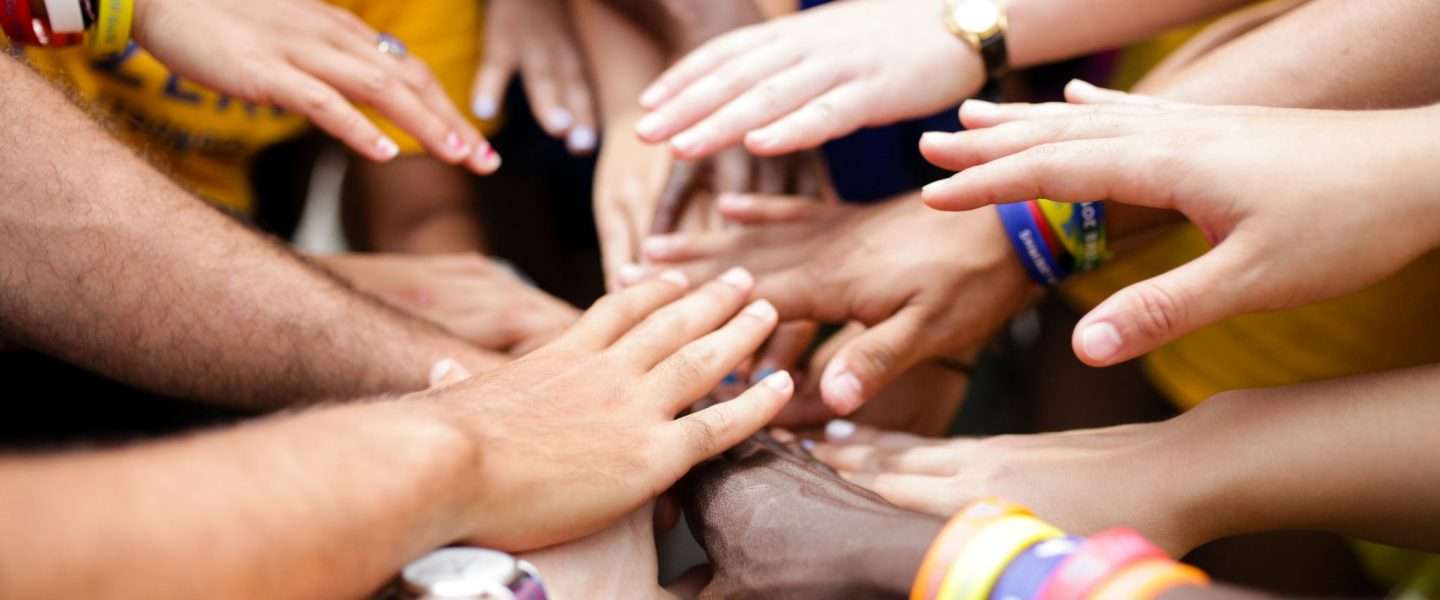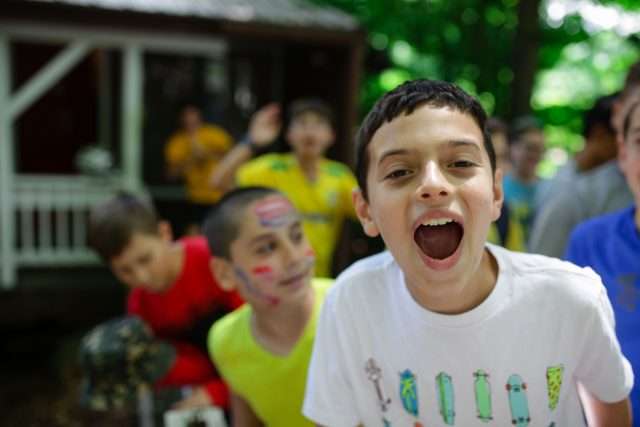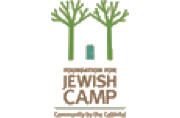
Request info package


Here are common questions about camp’s Jewish program, fitness, cooking, athletics and sports, and delicious food.
We’d love to discuss these questions and any others you might have. Please contact us at questions@campzeke.org or 212-913-9783.


Below are some highlights from a recent Camper Satisfaction Insights survey, which is completed by 8,000 parents from 70 Jewish camps. Our families rated Camp Zeke on a one to five scale. Every result below exceeds the national average – thank you!
Camp Zeke was founded in 2012 thanks to a $1.2 million grant from the Specialty Camps Incubator, a project of the Jim Joseph Foundation, AVI CHAI Foundation, and Foundation for Jewish Camp. We are eternally grateful for their unbelievable generosity!
Also, thanks to the kindness of the UJA-Federation of New York, we are situated on a truly spectacular site in the Pocono Mountains — complete with a private lake, heated pool, full gym, and upscale cabins! The UJA is also generously funding part of our year-round program, which includes fitness and culinary arts events in Jewish communities all over the country.
The Challenge of One Week
The appeal of the one week session is also its challenge: It’s just a week!
By the time a camper becomes fully comfortable in the camp community, the one-week experience is already nearing its conclusion. Here’s what we mean: For all campers, the first day can be a bit awkward. We organize countless ice-breakers and group bonding activities, but campers still arrive without knowing anyone, and they have to take a big step out of their comfort zones to meet new people and establish their first friendships. Of course, learning to overcome challenges is part of the value of camp!
By the second day of camp, they start to form bonds with their bunkmates and begin learning the camp routines, such as where things are located, the words to camp songs, our many traditions, and the names of their favorite staff members. It’s only by day three or four that kids get into a rhythm and start to feel truly comfortable in their new environment. Just as things become really fun and campers first glimpse the magic of camp, it’s almost time to go home.
Three Days of Joy for Every One Day of Transition/Packing
Three week sessions are often harder on parents, but they are much better for campers. When campers stay for a three week session, they spend a much larger percentage of their time being fully immersed in camp. The first days of transition become distant memories that are replaced by deepening friendships, new experiences, “secret” cookie raids, campfires, and lots of camp songs and traditions. The experience is then capped off with color war, lazy day, many of the most popular all-camp programs, and finally, a beautiful, song-filled banquet as a final send-off for the campers. The kids go home at the same time as everyone else, they immediately engage with friends after camp, and the experience lives on after the summer. Campers who stay for a shorter time tend to be among among the only ones to leave early, which can also be an isolating experience for them.
As one camp expert, Steve Baskin, puts it: “A camper in a one-week session is only fully integrated for a couple days of the seven (roughly one-fourth) versus 15-16 out of 21 (three-fourths) of three week session.” This is why three week campers are more likely to gain the most from camp; they simply have more fully-integrated days of the camp experience. As Baskin explains, “I like for campers to have three days of joy and comfort for every one day of disorientation/packing, which is essentially assured in a three week session.”
The vast majority of our campers attend a three or six week session. About 40% of our campers stay for the full season.
We do a few things before camp starts to make sure new campers feel totally at home once they arrive to camp. In the lead up to camp, parents of new campers can contact us for an introduction to another camper or two in the same bunk. That way kids will already have a familiar face when they arrive to camp.
Parents can also contact us to take a guided tour of our 500-acre summer home. We love showing our new families the special spaces where our campers gain fitness and cooking skills, make amazing memories, and form lifelong friendships in a warm, Jewish community.
By the time campers meet another person in their bunk, and tour camp, they’ll come fully prepared to dive into the experience!
Yes! We are fully accredited by the ACA. This means we meet all the highest standards in the camping industry. Beyond accreditation, when we plan the summer, our primary concern is the safety and well-being every camper and staff member in the community.
Every night, we post hundreds of pictures so parents can go online and see their kids in action, and we send home three to four email newsletters a week to explain everything going on in camp. Parents also have a unit head who they can call any time for an update about how their camper is doing, who their camper is making friends with, what they’re eating at meals, etc. Parents can also write letters and send emails into camp as often as they want. We print the emails every morning. Campers can mail letters home or write eLetters which are letters written on a special page of eLetter stationery containing a unique, printed barcode. The camp office will scan and upload camper eLetters daily, so parent can receive them much quicker than traditional mail. We also have a visiting day for the kids who are staying more than three weeks.
We suggest a video call or a home visit! We’ll tell you all about the program, show lots of pictures, and answer everyone’s questions! Just email questions@campzeke.org or call 212-913-9783 to set it up!
Please visit this page to see the details of our approach to celebrating diversity.
Shabbat is one of the most fun, joyful days of the week! We have festive Shabbat meals, complete with challah and other special foods made by campers. Before Shabbat begins, we decorate Café Zeke with beautiful artwork that campers created during the prior week. On Friday night and Saturday morning, we have song-filled services with everyone in camp dressed in white and blue.
On Saturday, the entire camp has a late wake-up, we replace many more physically-challenging electives with more reflective ones, and everybody comes together to appreciate our blessings, strengthen our friendships, and relax before the new week. At the end of Shabbat, we dance and sing in the new week with an all-camp Havdalah service.
You’ll see our love of Judaism and Israel in everything we do! During meals, we serve many traditional Jewish and Israeli foods, and as part of our culinary arts program, campers prepare these foods in a healthy way. Our fitness options include Krav Maga (Israeli self-defense), Israeli dancing, spirituality on the hiking trail, Torah yoga, and other similarly-inspired activities. We also have special events about Israeli life and culture, such as Israel parades and Israeli music concerts. The common theme running through Camp Zeke’s program is the Jewish teaching of shmirat ha’guf, or taking care of the body.
We also hire many Israeli staff members. When they’re not coaching activities like running, yoga, strength training, Krav Maga, and dance, they’re doing things like telling campers about Israel around a campfire or showing kids the guitar chords to classic Israeli folk songs.
We weave Judaism into our program just as seamlessly as we weave Israel into our program. For example, campers might sign up for a cooking elective in which they’ll throw on aprons and make whole wheat challah with our chef. While putting the finishing touches on their culinary creations, the chef might lead a discussion about how the rules of kashrut, just like the rules of nutrition, dictate what we put into our bodies.
As you can see in our sample schedule, we don’t have “Jewish period” at camp — that’s because everything we do is Jewish!
Camp Zeke is pluralistic, egalitarian, and not affiliated with a particular Jewish movement. We know the Jewish community coalesces around healthy living, Israel, love of Jewish culture, and a desire for joyful, meaningful Jewish experiences. By focusing on the things that bring us together, our goal is for kids of varied Jewish backgrounds to feel completely at home!
Our angle is that there are many different ways to practice Judaism and be Jewish, and campers are going to see them all at camp. Everybody is welcome regardless of their level of observance (or lack thereof) at home. We never say “This is the right way to be Jewish,” or “This is how Jewish people do things.” Rather we recognize the diversity of Jewish practice and strive for everyone to feel comfortable. For example, this is why we offer “Shabboptions” on Saturday mornings, ranging from traditional services to a spiritual hike. Campers can engage however they feel most comfortable.
Absolutely! We welcome interfaith families with open arms. Camp is a joyful Jewish community that’s based on values including kindness, welcoming new members of the community, and inclusion. We recognize that Judaism and Jewish practice mean different things to different families, and we believe that every camper and their unique background contributes invaluably to our camp culture and community.
Yes! We have a totally even split of campers and staff from every Jewish background — unaffiliated, reform, conservative, reconstructionist, interfaith, and modern orthodox.
Camp Zeke is an independent Jewish camp that is not affiliated with a particular movement. We have Jewish kids of all different backgrounds. Some of our campers and staff are modern orthodox and many others are not. We do our best to make camp a very comfortable environment for everyone.
Our food is kosher and our kitchen is supervised by a mashgiach. We are also shomer shabbat in the public areas of camp, which means we don’t play music, cook, drive, etc. throughout shabbat.
In their actual housing, campers are allowed to do what they are comfortable doing at home. Some campers don’t use lights, while others do–it’s all about what makes each camper most comfortable.
Our goal in camp is to create a joyful Jewish environment in which everybody brings the very best of their cultural or religious Jewish experience. We have many different kinds of Jewish people in camp, and we welcome them all!
Yes! Our kitchen is totally kosher. Please contact questions@campzeke.org for details.
Absolutely! Our chefs and culinary arts instructors cater to all types of dietary requirements. Whether you’re gluten free, nut free, lactose intolerant, or vegan, we’ve gone out of our way to create delicious options at every meal.
All of camp is sesame-free and nut-free. We also have a separate gluten free kitchen and a separate allergy kitchen.
Camp Zeke is nut free. We don’t serve peanuts, tree nuts, peanut butter or any products containing nuts. We use Sunbutter instead of peanut butter, and many campers say it tastes better! Please note that we use coconut products in our main kitchen, along with various seeds such as sunflower. Camp is also sesame free.
We work with local farms and serve lots of organic fruits and vegetables. We also serve many conventional foods too, which we either cannot buy local and organic, or which would be too expensive to buy local and organic. We do our best to balance all the different considerations that go into food purchasing to ensure that our food program aligns with the camp’s values.
In addition to learning a wide variety of cooking skills and culinary theory, at the end of each summer, families receive a cookbook of everything the campers made in culinary arts that summer.
We have many picky eaters at camp and lots of options to ensure that everyone finds something they like. Our meals consist of big buffets with numerous choices at each one.
At breakfast, there’s a hot main course that rotates every day, including things like scrambled eggs, waffles, pancakes, French toast, etc. We also have a cereal station with different cereal options, an oatmeal station with a variety of toppings, and a huge cold bar with fruit, yogurt, breads, cheeses, and lots of similar items.
At lunch and dinner, there’s a rotating main course such as pizza made from scratch, chicken wings from a local farm, burritos rolled in our kitchen, and similar dishes. If we serve something like quinoa, we always include another main course for campers who want a more traditional option. And no matter what we serve, there’s also a backup option in case a camper doesn’t like the primary option (the backup option rotates between rice bowls, pasta bowls, and a baked potato bar). In addition, we have a huge salad bar with fresh vegetables, pre-made salads, and all sorts of toppings, and at both lunch and dinner, we also have a soup station with various fresh-baked breads.
Besides the meals, we have three snacks a day and a canteen that includes a smoothie bar, trail mix, and similar delicious and healthy snacks. There are also bottomless fruit bowls around camp. Picky eaters tend to do well with all these options, and many families actually choose Camp Zeke because their campers are picky eater.
If your camper is feeling under the weather at camp, he or she will receive comforting and professional care. Our health center is staffed 24 hours a day by two caring nurses, who know every single camper by name. They work hand in hand with our camp doctors.
All campers join a health and safety orientation during the first 48 hours of camp, which covers topics including: daily hygiene and hand washing; food safety; lyme disease prevention; poison ivy identification; appropriate behavior and relationships; safety rules; and what to do in the event of an illness or injury.
Camp Zeke’s new health center is air-conditioned, centrally located, and feels like home. Our nurses live in the health center, and are right there when campers call. The nurse keeps an assortment of delicious snacks on hand, and kids who stay in the health center are allowed to watch television (just don’t tell the other campers!).
At Camp Zeke, our top priorities are to keep kids safe and healthy, and make sure they have an amazing and memorable summer. Our nurses share this mission and play an integral role in the camp community. When not caring for campers, the nurses join campers for meals and evening activities, jump in on daily electives, and are fully immersed in the camp community.
Our campers range in age from 7 to 17. High-school-aged campers can join our teen leadership program. See details here.
When we assess whether a camper is ready for camp, one of the most important questions is whether the camper is excited to go. Regardless of their age, the campers who are excited about the experience do very well in camp. And we provide all the support they’ll need to thrive in the community. We put especially-strong counselors with that age group, and they help a lot with self-care. Also, our camper care team and unit heads constantly check in to make sure the youngest campers are successful. So it’s a very supportive environment for them.
We also recognize that sending kids to camp is sometimes more challenging for the parents than the campers! We welcome parents (regardless of their camper’s age!) to call the office and get a full update any time.
Absolutely! We have numerous campers join us across older age groups every summer.
To explain why, we have to briefly look backwards: Camp Zeke is a fairly new camp. Back in 2012, we started all the planning to launch the camp from scratch. We opened for our first summer with 140 campers across age groups.
At the time, camp was appealing to many families because their campers could start at an older age. Whether accurate or not, the perception of traditional camps is that kids start at 7 years old and keep coming back every summer, which makes it hard for older kids to join for the first time.
By contrast, we have always welcomed new campers across age groups with open arms. That aspect of our culture has stuck with each passing year. Every summer we have campers join us all the way up to age 17. To take a random age group as an example, it’s common for us to have five rising ninth grade girls who are brand new to Zeke, four rising tenth grade boys who are joining our teen leadership program for the first time, and a full bunk of brand new rising seventh graders (alongside another bunk of returning campers in that same age group).
If you have a specific question about this particular summer and your camper’s age group, please don’t hesitate to contact us. We’ll gladly check how many new campers are in the bunk! We also gladly make introductions between new campers and their bunkmates, which helps campers in every age group feel more comfortable coming to camp for the first time.
We have about 300 campers per session.
You can think of Camp Zeke as the health club of camps. People attend health clubs for a variety of reasons: to lift weights; to take dance classes; to practice yoga; to study martial arts; to take fun cooking classes; to be active in a supportive environment; to run; to swim; or to play sports.
Different campers attend Camp Zeke with different goals and interests — just like different gym members, no two campers are alike! What ties everyone together is a shared commitment to fitness, good nutrition, creating a warm, mentor-filled community, and having the greatest, most fun summers ever! While campers might focus on individual goals, the whole camp works as a team to become fitter, faster, and stronger, and learn some healthy recipes along the way.
For more information, please visit this page, which explains the different types of campers who attend Zeke.
At Camp Zeke, we have a unique process to make sure our campers are having an incredible experience. Our staff includes an entire camper care team, whose only job is to ensure that every single camper is thriving in the community. In any given summer, the camper care team might consist of two social workers, two teachers, a psychologist, and our director of camper care, who is an expert in child development. These people are always available to our campers and to our parents. Indeed, parents can always reach the camper care team by phone to check in about how their camper is doing.
Our camper care specialists walk around activities to observe campers throughout the day, and they also formally check in with every bunk twice a day (during rest hour and at bedtime). In addition, on every single night of camp, our counselors fill out a form called a “bunk log” about how their campers are doing. That form lets us know whether a camper needs a warmer blanket or more toothpaste, had a moment or homesickness earlier in the day, or could use some help making friends. The first thing the camper care team does on each morning of camp is review the bunk logs. Their goal is to ensure that any challenge is fully resolved by noon of that same day. The camper care team also works closely with parents to make them partners in the process.
The most important thing to keep in mind is that Camp Zeke is a small, tight-knit community in which we know every single camper. We’re watching every camper throughout the day, and parents can always call the office just to check in and see how their camper is doing. Campers and parents regularly express gratitude for the speed of our responses to their questions and the level of thoroughness with which we approach any request they have.
We do a few things before camp starts to make sure new campers feel totally at home once they arrive to camp. In the lead up to camp, parents of new campers can contact us for an introduction to another camper or two in the same bunk. That way kids will already have a familiar face when they arrive to camp.
Parents can also contact us to take a guided tour of our 500-acre summer home. We love showing our new families the special spaces where our campers gain fitness and cooking skills, make amazing memories, and form lifelong friendships in a warm, Jewish community.
By the time campers meet another person in their bunk, and tour camp, they’ll come fully prepared to dive into the experience!
One week campers are in a bunk of other one week campers. They may be able to extend if the three week bunk in their age group has an open space in it. While this is unlikely, it is sometimes possible.
We recommend that parents register campers for the length of time that parents would like them to stay. If a camper is registered for a week, then the camper will likely stay for a week. If parents would like their camper to stay for three weeks, the best thing to do is enroll the camper for three weeks.
Here’s why we suggest this approach: When campers are told that they can come for a week and then decide if they’d like to extend, they tend to spend the entire week struggling with the decision: “Should I stay? Should I go? I’m having so much fun, but I miss home. I can’t decide!” Instead of jumping into camp life, the campers deliberate about how long they should stay.
When parents enroll a camper for three weeks from the start, then the camper arrives to camp knowing that he or she will stay for three weeks. It allows them to just enjoy camp life without having to make any big decisions about staying longer or going home.
The one week session is a fine option. It’s a great introduction to the camp experience. If you keep your camper registered for a week, then you should assume that your camper will stay for a week. If you would like your camper to stay longer, then the best thing to do is register your camper for a longer session.
We ask families to arrive only on the first day of camp. From a camper’s standpoint, going to camp and being away from home is a difficult transition. It becomes much more difficult when a camper arrives a few days after everybody else. Everything about the first two days of camp is structured so that new campers become comfortable and fully immersed in the camp community. We have ice breaker games, cabin bonding rituals, and lots of other fun things to transition kids into the camp environment. Missing those first days means missing some really essential aspects of camp. Also, once camp starts, every single day is full of excitement, adventure, and many new experiences. The whole cabin spends every day bonding and becoming closer and closer. Because the days are so action-packed, campers who come a few days late can feel like they missed out on lots of activities and they won’t have the same shared experiences as the other kids in the bunk. So to make camp the most successful possible experience, campers should arrive on the first day of the session and at no other time.
Our short answer is that a three week session is a much more complete camp experience, and we recommend the three week option over the one week option. To understand why we make this recommendation, please read on!
The Challenge of One Week
The appeal of the one week session is also its challenge: It’s just a week!
By the time a camper becomes fully comfortable in the camp community, the one-week experience is already nearing its conclusion. Here’s what we mean: For all campers, the first day can be a bit awkward. We organize countless ice-breakers and group bonding activities, but campers still arrive without knowing anyone, and they have to take a big step out of their comfort zones to meet new people and establish their first friendships. Of course, learning to overcome challenges is part of the value of camp!
By the second day of camp, they start to form bonds with their bunkmates and begin learning the camp routines, such as where things are located, the words to camp songs, our many traditions, and the names of their favorite staff members. It’s only by day three or four that kids get into a rhythm and start to feel truly comfortable in their new environment. Just as things become really fun and campers first glimpse the magic of camp, it’s almost time to go home.
Three Days of Joy for Every One Day of Transition/Packing
Three week sessions are often harder on parents, but they are much better for campers. When campers stay for a three week session, they spend a much larger percentage of their time being fully immersed in camp. The first days of transition become distant memories that are replaced by deepening friendships, new experiences, “secret” cookie raids, campfires, and lots of camp songs and traditions. The experience is then capped off with color war, lazy day, many of the most popular all-camp programs, and finally, a beautiful, song-filled banquet as a final send-off for the campers. The kids go home at the same time as everyone else, they immediately engage with friends after camp, and the experience lives on after the summer. Campers who stay for a shorter time tend to be among among the only ones to leave early, which can also be an isolating experience for them.
As one camp expert, Steve Baskin, puts it: “A camper in a one-week session is only fully integrated for a couple days of the seven (roughly one-fourth) versus 15-16 out of 21 (three-fourths) of three week session.” This is why three week campers are more likely to gain the most from camp; they simply have more fully-integrated days of the camp experience. As Baskin explains, “I like for campers to have three days of joy and comfort for every one day of disorientation/packing, which is essentially assured in a three week session.”
We believe that it’s very important for a group of campers to stay together for the duration of the session. Campers make friendships very quickly in camp. Within a week of camp, each bunk becomes incredibly close, and those bonds deepen with each passing day of the three week session. The reason we don’t allow campers to leave a three week bunk early is because of the negative impact on the rest of the bunk. If a camper leaves after two weeks, then their bunkmates lose a best friend a week before the session ends. It has a negative impact on all the kids who stay, so we don’t allow it.
When we plan the dates for each summer, our ideal is to have each session start and end on a Sunday.
Sometimes this isn’t possible for a number of reasons. For example, we have to take into account the dates on which lower schools end in various cities and states, the dates on which universities end finals (for domestic staff arrival), international college dates and travel schedules (for international staff), and various other logistical considerations.
Here’s an example of what often happens: A particular school system ends on a Monday. So for us to start on Sunday means that we would need to delay all of camp for an entire week, which means we would end the summer at a time when schools in another district are already starting classes.
Likewise, it often happens that we need to leave enough time for staff to arrive for pre-camp training (they go through an extensive training before camp starts!), but they can’t arrive as early as we’d like because of academic calendars. To leave enough time, we can’t start on a Sunday because then certain important training sessions wouldn’t be given sufficient attention.
An added wrinkle is that we can’t start or end on Saturday because some of our families don’t drive on Shabbat. Of course, many others do, but we want to ensure that every family is welcome at camp regardless of how they practice Judaism at home! So our starting point for setting dates is Sunday to Sunday.
Putting all these puzzle pieces together, we set our dates for the summer. We know that the ideal for working parents is to start and end on a weekend, and that’s always our goal. It’s sometimes not possible, but we put extensive thought into the decision before deviating from the Sunday-to-Sunday ideal.
Campers are assigned to cabins based on their age and grade.
Yes! We accommodate these types of requests whenever possible.
Campers live in beautiful, air-conditioned and heated bunks. We just renovated all of them. Each bunk houses 12 to 13 campers and 3 counselors. Bunkmates share four private bathrooms, showers, and sinks. Each bunk is attached to a lake-view lounge for socializing with friends, participating in group activities, and winding down energy-filled days. Read more about our facility.
Every day! Camp Zeke is a small, warm community in which all campers see each other throughout the day. Siblings have numerous opportunities to say hello and spend time together. To give a few examples, the entire camp gathers at: Morning Warm-Up; Breakfast, Lunch, and Dinner; All Camp Hang Out; and Evening Activity. That’s a lot, huh?
Parents will have a lot of communication with camp. First of all, we post hundreds of pictures every night, so parents can always go online and see their camper and camp in action. Campers also have access to those pictures when they go home, so they can relive all the fun and memories of camp.
Second, each parent/camper is assigned a unit head. In camp, campers can ask their unit head for anything they need, such as a warmer blanket, an extra snack at night, or anything else that comes up. Parents will have the unit head’s phone number and email address. They can contact the unit head any time just to check in. For example, parents can ask what their camper is eating at meals, how friendships are going, what activities their camper is doing, and any other questions they may have. The unit head will provide a full update.
Third, we will send home frequent email newsletters with updates about everything going on in camp. We send those a few days per week.
Of course, parents can send letters and emails to their campers — we encourage parents to write really often! We print the emails every morning and collect mail every day. Parents should expect campers to write home at least once per week, and campers can also write home more often than that if they want. Campers can mail letters home or write eLetters which are letters written on a special page of eLetter stationery containing a unique, printed barcode. The camp office will scan and upload camper eLetters daily, so parent can receive them much quicker than traditional mail. Campers do not have phones in camp and we don’t have scheduled phone calls, but parents can contact their unit head for an update any time.
There was a time when we scheduled calls between campers and parents. Over the years, we have found that calls home from camp often have the exact opposite of their intended effect. While calls home are motivated by the best of intentions, hearing a parent’s voice often takes kids out of camp’s happy, self-contained community and leads to homesickness that wouldn’t otherwise occur. Something about hearing a parent’s voice can trigger feelings of sadness that aren’t triggered by letters and emails to camp. Having seen this year after year, we no longer schedule calls home. We can still facilitate a phone call by parent request, but we discourage them and always caution parents that phone calls often cause homesickness that would not otherwise be present.
Parents will have their unit head’s phone number and email address. They can contact the unit head any time just to check in. For example, parents can ask what their camper is eating at meals, how friendships are going, what activities their camper is doing, and any other questions they may have. The unit head will provide a full update. Campers will also write letters home and parents can write emails and letters to camp.
Yes! Campers choose daily electives and spend the rest of their day exploring all of Camp Zeke’s activities with their cabin-mates. The number of elective periods per day varies according to age.
Our activities fall within the following areas: cooking; fitness; sports; performing and visual arts; waterfront/swim; and special events. Read more on our Program page.
Our mascot! You never know where he’ll fly to next! 🦅
Camp Zeke is a screen-free environment. We don’t allow phones, tablets, or any other devices with screens. During their time at camp, our campers discover the lost art of interpersonal communication.
Our year-round and summer office line is 212-913-9783. For general questions, please call us, or send an email to questions@campzeke.org. For more details and to contact other staff, please visit the Contact & Directions page.
We are located at 31 Barry Watson Way in Lakewood, PA. Camp Zeke is situated on 560 wooded acres in the foothills of the Pocono Mountains. For more about our site, please visit the Facility page.
Our summer mailing address is: Camp Zeke, CAMPER NAME, P.O. Box 253, 31 Barry Watson Way, Lakewood, PA, 18439. This is where you should address letters to campers. For transportation questions, please visit the contact page.
We have an office in Manhattan and Westchester County, and we also travel around the country meeting with families in their homes and at synagogues and community centers. If you would like to meet us in your area, please be in touch and we’ll schedule something. For details about sending us mail or contacting specific people within Camp Zeke, please go to this page for all our contact information.
In Camp Zeke’s small, tightly-knit community, kindness and inclusion are the highest value. We know that our staff is the single most important factor in turning those values into a reality while creating our warm, caring culture and ensuring that kids have an amazing summer.
Because Camp Zeke is the first and only Jewish camp to celebrate healthy, active living, we receive a tremendous number of job applications from like-minded college and graduate students. We are in the fortunate position of having numerous applicants for each open position, and that allows us to be extremely selective in the hiring process.
Prior to being offered a job, each staff member goes through a multi-stage interview process and extensive reference checks. Training begins during seminars which take place throughout the year, well before the summer even starts. The week before campers arrive marks the culmination of our pre-summer training. Staff live at camp and learn from experts in health, education, safety, and child development. Training continues throughout the summer, and we evaluate staff early and often to ensure that they implement the lessons they learned during the off-season.
Because safety is our number one priority, we have a 3:1 ratio of campers to staff and otherwise exceed industry standards in our training and hiring.
Please visit our Teen Programs page and read through this FAQ!
The LIT (Leader in Training) and CIT (Counselor-in-Training) programs both offer exciting opportunities to develop leadership skills and take on responsibilities within our camp community.
LIT Program:
CIT Program:
Both programs offer valuable experiences, but the key distinction is that the LIT program allows campers to continue enjoying the typical camp experience, while the CIT program focuses more on training and preparing campers for future counselor roles.
LIT (Leader in Training) participants:
The LIT program is tailored for campers entering grades 10th through 12th who wish to enjoy the camp experience while taking on additional responsibilities. Participants in this program have the unique opportunity to actively engage in camp activities, assist in various activity areas, and contribute to the planning of special events, such as the Color Run. It serves as an ideal entry point for teenagers at camp and marks the initial stage of their journey toward becoming CITs (Counselors-in-Training).
The CIT Program is an invitation-based program for rising 11th and 12th graders. It’s typically open to campers who have been through the LIT program.
A CIT helps make the magic of camp happen! This is the true transition program between camper (LIT) to staff (Junior Counselor). Our CIT program is designed to give teens a taste of the different jobs at camp, while still experiencing the camp activities that they love. From a logistics standpoint, CITs will assist through a rotation of different service areas around camp in the morning, and then participate in exclusive CIT activities in the afternoon and evening. Possible service areas include being:
CITs will have the opportunity to serve in several different areas around camp, with a focus on the operation of camp from a program and service perspective. CITs will generally not be responsible for the supervision of campers but may sometimes assist with camper supervision as well (such as occasional OD and bunk coverage).
The CIT program is intentionally designed to provide CITs with a different and more immersive experience compared to traditional campers. CITs will have a dedicated counselor who serves as their mentor and offers 24/7 support. Additionally, the CIT program director will always be available to assist and guide them.
The CIT counselors and program director play vital roles in shaping the CITs’ development and leadership skills. While CITs live with a counselor who serves as their mentor, they also enjoy exclusive privileges such as access to teen-only program spaces, special evening activities, and designated free time.
CITs are allowed cell phone use during certain specific times of day.
LITs live in a bunk of LITs, and CITs will live in a bunk of CITs. LITs have traditional counselors living in the bunk, while CITs have more autonomy and a CIT counselor who is more of a mentor than a regular counselor that will stay in the bunk with them.
While CITs will have a program supervisor, CITs will be ultimately responsible for waking up on time, cleaning their space, etc. LITs will have more guidance in all of these areas. The LIT program is a transition to the CIT program, and the CIT program is a transition to the Junior Counselor program. LITs and CITs are therefore supervised differently commensurate with their different roles in camp.
Yes! Absolutely. Both the LIT program and CIT program are completely optional. There is no requirement to join either. If you think you might be interested in working at camp as a Junior Counselor or staff member in a future summer, then we encourage you to start in the LIT Program and then join the CIT Program. However, if you don’t join either, we’ll still gladly interview you for staff positions in future summers and give your application very serious consideration. You can always just have a responsibility-free summer as a camper!
Yes, CIT will have shirts, and just like the staff, you will be required to wear your CIT shirt every day during your service time.
CITs hold a unique position in the camp community and are at a transition point between being campers and staff. The CIT program is tailored to assist teens in transitioning into leadership positions while maintaining their camper experience.
CITs have many more privileges and opportunities than campers while still receiving mentorship and staff support. They actively participate in the camp community, and while they have responsibilities in specific areas around camp, they do not run these areas independently. Instead, they work closely with our experienced counselors, shadowing and learning from them.
The focus of the CIT program is on mentorship and skill development, with an emphasis on collaboration rather than expecting perfection from the start. This approach ensures that CITs can smoothly transition into their future staff roles while enjoying the full spectrum of camp activities and adventures.
Yes, you will earn hours for your service, and camp will issue a letter verifying those hours upon request at the end of the summer.
No, for all the reasons that campers don’t have phones, the LIT program is a screen-free program.
CITs have a regulated cell phone policy that allows them to use their phones for educational purposes during specific times of the day. While they won’t have their phones with them 24/7, the CIT Program director will be responsible for holding their phones and distributing them during designated hours.
These designated hours coincide with educational and leadership training sessions, often referred to as CIT Camp. CITs can use their phones as valuable learning tools during these sessions and other relevant activities, ensuring that technology serves as a beneficial resource for their growth and development within the program.
CITs will also have some opportunities to use their phones to communicate with friends and family.
Our Junior Counselors are full staff members. The program is a highly-competitive program that is typically only open to those who have completed camp’s CIT program. To apply and learn more about the staff experience at camp, please visit: Join Our Staff.
Our campers have made thousands of friendships, millions of memories, and lifelong skills in athletics, cooking, and joyful Judaism. We are proudly supported by:












We are fully accredited by the American Camp Association